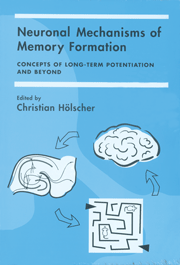Book contents
- Frontmatter
- Contents
- Contributors
- Introduction: Long-Term Potentiation as a Model for Memory Mechanisms: The Story So Far
- Section One Long-Term Potentiation In Vitro and In Vivo: How Can We Fine-Tune the Current Models for Memory Formation?
- Section Two There is More to the Picture Than Long-Term Potentiation: Theta or Gamma Oscillations in the Brain and the Facilitation of Synaptic Plasticity
- Section Three Making Models from Empirical Data of Synaptic Plasticity
- 9 Toward a Physiologic Explanation of Behavioral Data on Human Memory: The Role of Theta-Gamma Oscillations and NMDAR-Dependent LTP
- 10 Neuronal Networks, Synaptic Plasticity, and Memory Systems in Primates
- 11 Revisiting the LTP Orthodoxy: Plasticity versus Pathology
- 12 Long-Term Potentiation and Associative Learning: Can the Mechanism Subserve the Process?
- Section Four Setting the Stage for Memory Formation: Stress, Arousal, and Attention
- Section Five Transgenic Mice as Tools to Unravel the Mechanisms of Memory Formation
- Conclusions and Future Targets
- Index
12 - Long-Term Potentiation and Associative Learning: Can the Mechanism Subserve the Process?
Published online by Cambridge University Press: 13 October 2009
- Frontmatter
- Contents
- Contributors
- Introduction: Long-Term Potentiation as a Model for Memory Mechanisms: The Story So Far
- Section One Long-Term Potentiation In Vitro and In Vivo: How Can We Fine-Tune the Current Models for Memory Formation?
- Section Two There is More to the Picture Than Long-Term Potentiation: Theta or Gamma Oscillations in the Brain and the Facilitation of Synaptic Plasticity
- Section Three Making Models from Empirical Data of Synaptic Plasticity
- 9 Toward a Physiologic Explanation of Behavioral Data on Human Memory: The Role of Theta-Gamma Oscillations and NMDAR-Dependent LTP
- 10 Neuronal Networks, Synaptic Plasticity, and Memory Systems in Primates
- 11 Revisiting the LTP Orthodoxy: Plasticity versus Pathology
- 12 Long-Term Potentiation and Associative Learning: Can the Mechanism Subserve the Process?
- Section Four Setting the Stage for Memory Formation: Stress, Arousal, and Attention
- Section Five Transgenic Mice as Tools to Unravel the Mechanisms of Memory Formation
- Conclusions and Future Targets
- Index
Summary
SUMMARY
In several forms in the mammalian brain, long-term potentiation (LTP) displays certain neurophysiologic characteristics that are commonly regarded as evidence that this mechanism for neuronal plasticity subserves the induction and/or storage of associative memories. In particular, the associative nature of LTP (induction by conjoint pre- and postsynaptic activity) and its dependence on relatively short interstimulus intervals between pre- and postsynaptic activity suggest certain qualitative similarities between LTP induction and the processes that define associative learning. Despite the popular acceptance of this cursory evidence, the processes that govern the formation and expression of associative memories are far more malleable and heterogeneous than those suggested by such mechanistic analogies. Here we describe in some detail the fundamental characteristics of the associative learning process, with an emphasis on those characteristics that are relevant to the assertion that LTP is an appropriate device for the storage of associative memories. With this as our point of reference, we are left to conclude that the mechanistic properties of LTP are in some instances irrelevant, and in some cases contraindicate, a role for LTP in the induction or storage of associative memories.
Introduction
Associative learning, an example of which is classical conditioning, is often described as a “simple” form of learning, limited in application to the modification of reflexive behaviors. This colloquial description is an unfortunate characterization of the phenomenon that misrepresents the fundamental nature and range of influence of associative learning. The insights that could be derived from a complete appreciation of the associative learning process were obvious to Ivan Pavlov, the Nobel Prize winner in 1904 for his studies on the physiology of digestion.
Information
- Type
- Chapter
- Information
- Neuronal Mechanisms of Memory FormationConcepts of Long-term Potentiation and Beyond, pp. 294 - 324Publisher: Cambridge University PressPrint publication year: 2000
Accessibility standard: Unknown
Why this information is here
This section outlines the accessibility features of this content - including support for screen readers, full keyboard navigation and high-contrast display options. This may not be relevant for you.Accessibility Information
- 1
- Cited by
